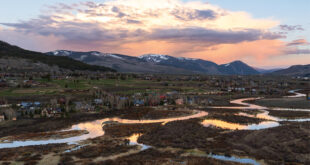Several Crested Butte Town Council representatives, especially long-serving councilman Jim Schmidt, keep lamenting about how the short-term rental (STR) issue is the most difficult issue in the history of humanity. Part of that is that after months and months of extensive discussion there is no clear answer…except one that for some reason keeps being glossed over.
And then there’s the politics of the issue and politicians, especially in a small town, have a difficult time making hard decisions that impact friends and neighbors. The STR issue falls into this category. Understandable.
So here is a potential path to address the issue in ways both sides seem to want: Do not pass ordinance 12, series 2016. Instead, instruct the town staff to enforce the current zoning regulations, temporarily extend existing licenses in prohibited zones, consider a clean 2017 ordinance addressing health and safety issues and be done with it. Seriously.
Here is what that would accomplish: It would keep the STR issue in the realm of zoning, which under a Home Rule municipality such as Crested Butte would seem to have stronger legal foundations than coming up with an arbitrary number limiting everyone to renting no more than 120 (or 30 or 90 or 180) nights a year. It puts a hard limit on the number of units in town that could be short-termed. It would allow people who currently have a legal right to short-term rent their homes in town to keep short-term renting their homes. It would ultimately eliminate STRs in several Crested Butte neighborhoods (with a few caveats), thus “preserving” some areas in town as strictly residential neighborhoods without the “hotel” influence. It would apply the established rules that people should have understood when purchasing a property.
Now, because the town for some reason (let’s call it an oversight and everyone makes oversights) issued STR business licenses for several properties in zones where under the law STRs are not permitted, the council could be reasonable and either “grandfather in” those properties with such business licenses and allow them to continue to short-term rent until the property is sold—or give them a good buffer period of several years to ease out of the STR market. That’s probably the trickiest part of the deal but it is not insurmountable.
I sort of understand the “fairness argument” of passing regulations to open up almost every residential property except deed-restricted units in Crested Butte to STRs. But let’s be honest and admit that zoning is rarely considered “fair” when someone within that zone wants to do something that is prohibited. As Schmidt always points out, zoning is there to prohibit a pig farm from being established next to a preschool. That’s zoning. And the current zoning has been in place for years. Many people who currently think they have an “unlimited right” to rent their property are mistaken. Under the current town land use zoning regulations, if you have a unit in places like the Meadows condo complex, the mobile home district, the Verzuh annexation area, you should not be short-term renting your place under town law.
Which also brings in the weird conflict of interest issue with this council. When this STR issue first got heated with talk of a moratorium, five of the seven councilmembers suddenly had STR licenses. Right now three members of the council—mayor Glenn Michel, and councilmembers Laura Mitchell and Paul Merck—have STR business licenses. Mitchell and Michel hold them in zones that do not technically permit STRs. Now, all three have valid and good reasons for obtaining their license—just like everyone else in town who has one. STRs help or could help them in the future live here and make financial ends meet as town gets more expensive. It helps pay the mortgage. It is there in case of an emergency, where extra income might be needed.
And while they’ve been told there is no blatant conflict of interest, a common sense gut check would say otherwise. I just want them to again be aware of that element that is part of the citizen evaluation and discussion in this whole process.
Which brings me to the next point. There seems a presumption that if a property has an STR license it is automatically more valuable than a house without such a license. That is the New York taxi medallion argument that those with current STR licenses hit the jackpot and everyone else is a loser, so it is only fair to make the playing field exactly level for everyone in town.
But I will make the argument that if you enforce the current zoning and deliberately preserve some carved-out neighborhoods that do not have STRs in them, the houses in those STR-free neighborhoods could increase in value faster than homes in an STR neighborhood. I will argue that as people look to move to Crested Butte, they might seek out those areas where they will not have an STR “hotel” located next door that comes with all the hassles that have been pointed out over the last several months: not knowing your neighbors, parking issues, noise issues, trash issues, strange dog issues and so on. I will make the argument that by passing the current proposal and significantly expanding the neighborhoods in Crested Butte where STRs are allowed under the town regs, you actually go against one of the perceived reasons to address the STR issue—the idea of preserving a stable community that is more community than hotel.
By enforcing current zoning there will still be plenty of STR opportunity in town and council members will be acknowledging how this new economy works without putting their heads in the sand. Visitors will still be able to find a place with a kitchen to stay in the town of Crested Butte. Businesses will continue to get the tourism benefit, as will property managers and employees who service that business.
So right now the council has a mechanism in place that limits short-term rentals in town. Right now the council has a mechanism in place that sets aside distinct neighborhoods to not have short-term rentals in them. The council could address and give leeway to those properties in STR-prohibited zones with current STR business licenses issued by the town since the town was the one that tripped up, but eventually those could disappear. That all seems fair and I’ve never understood why the policy makers on the council have glossed over that option.
An effective path to address and limit STRs in town is to look at moving ahead with the health and safety aspects under a new document. And then seriously discuss not doing anything else but enforcing what is already on the books with a carve-out for existing STRs.
—Mark Reaman
 The Crested Butte News Serving the Gunnison Valley since 1999
The Crested Butte News Serving the Gunnison Valley since 1999





